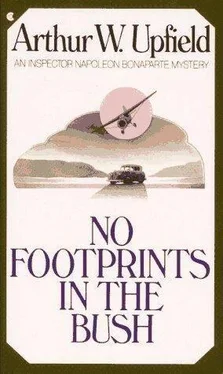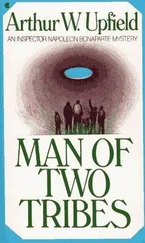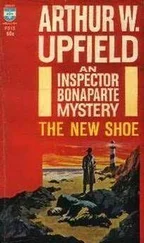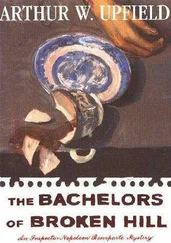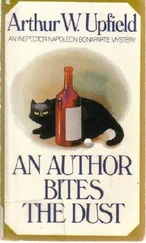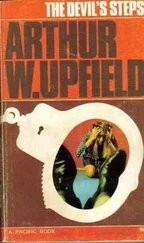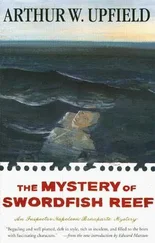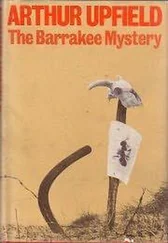Arthur Upfield - No footprints in the bush
Здесь есть возможность читать онлайн «Arthur Upfield - No footprints in the bush» весь текст электронной книги совершенно бесплатно (целиком полную версию без сокращений). В некоторых случаях можно слушать аудио, скачать через торрент в формате fb2 и присутствует краткое содержание. Жанр: Классический детектив, на английском языке. Описание произведения, (предисловие) а так же отзывы посетителей доступны на портале библиотеки ЛибКат.
- Название:No footprints in the bush
- Автор:
- Жанр:
- Год:неизвестен
- ISBN:нет данных
- Рейтинг книги:5 / 5. Голосов: 1
-
Избранное:Добавить в избранное
- Отзывы:
-
Ваша оценка:
- 100
- 1
- 2
- 3
- 4
- 5
No footprints in the bush: краткое содержание, описание и аннотация
Предлагаем к чтению аннотацию, описание, краткое содержание или предисловие (зависит от того, что написал сам автор книги «No footprints in the bush»). Если вы не нашли необходимую информацию о книге — напишите в комментариях, мы постараемся отыскать её.
No footprints in the bush — читать онлайн бесплатно полную книгу (весь текст) целиком
Ниже представлен текст книги, разбитый по страницам. Система сохранения места последней прочитанной страницы, позволяет с удобством читать онлайн бесплатно книгу «No footprints in the bush», без необходимости каждый раз заново искать на чём Вы остановились. Поставьте закладку, и сможете в любой момент перейти на страницу, на которой закончили чтение.
Интервал:
Закладка:
“How the hell do I know how the dent got into your lawn?” asked the cook.
“Well, as your mind’s a bit weak, Alf, I tell you something else what I can’t make out.”
The cook rose to his feet, stalked to one of the open windows and expectorated a stream of diluted nicotine.
“There’s lots of things youain’t making’ out thismornin ’. What’s this new one?”
The old man stood up, seemingly the better to make his remarks clearer by means of sauce bottles, milk jug and sugar tin.
“Now, this here’s the bed of them MadamLeroys,” he began. “This here is the dent on the lawn. Now here, in this part of the Madam Leroy rose bed, is where I seen a disturbance of the ground, and under the disturbance I finds a treacle tin. It’s been buried there.”
“One of thedorgs, I suppose.”
“Dorgmeeye. In that treacle tin was a lot of dry sand, the same as the dry sand in the dent. Now why should anyone bury a treacle tin with sand in it, in my best rose bed?”
“Yes,” Bony said in support. “Why should anyone burya treacle tin in that rose bed?”
“How do I know?” demanded the cook. “Why dodorgs bark? Why do men work like slaves? Why do motorsteerin ’ gears go bung at the wrong time? Why do airplanes fly around after dark? Why do nigs walk aboutcarryin ’ suitcases?”
“Suitcases!” exclaimed Bony.
“That’s what I said,” stoutly maintained the cook. “Early this morning’I seen Itcheroowalkin ’ away from the stockyards, carryin ’ a suitcase. All he wanted to complete thepitchur was a top ’at.”
“Was it a large suitcase?” pressed Bony.
“Large! It wasn’t much larger than a fair sized damper. What with the nigscarryin ’ suitcases around before breakfast, and dents and dry sand and airplanes and things, the world’scomin ’ to a pretty fine pitch.”
“The world!”sneered the old man. “Whatd’youknow about the world?”
“More’nyou do, anyhow. Youain’t seen theflamin ’ world for the last seventy years,” replied the cook.
II
Bony was admiring the roses when the breakfast gong was struck and Flora McPherson emerged from the house.
“Good morning, Inspector! Don’t you think old Jack is wonderful, growing these roses in the middle of Australia?”
“I am uncertain which is the more wonderful-the garden or the gardener,” Bony smilingly said. “Good morning!”
She caught his mood, standing with black hair teased by the breeze and gazing southward over the plain into which already was creeping the mirage, the burning water. She was thinking that to rely on first, or even second, impressions is an error. Bony said:
“I met the gardener only an hour ago. How old is he, do you know?”
“Well, Jack says he’s only seventy-one, but uncle knows he must be over ninety.”
“Ninety! Then he will not be old until he’s past a hundred and twenty.”
“He’s one of the great originals,” she said, as they walked slowly to the house. “Old Jack came here with grandfather; drove one of the bullock wagons. It was grandmother and he who first started the garden here. The locusts came and destroyed it time and again, but Jack now defies them by protectingall the garden with sheets of hessian. Have you seen the cemetery?”
“No.”
“It’s over there beyond those sugar gums. You should visit it sometime. It’s a shrine. Ah, here’s uncle looking for his break-fast. Morning, uncle!”
“Morning dear! Morning, Inspector!”
McPherson’s bearing was again erect, defiant of the world.
“I have been admiring the garden,” Bony said when he had followed the girl up to the veranda. And there he sighed loudly, adding: “I do wish you people would call me merely Bony. My wife does. So do my three boys. So does my Chief Commissioner and my department chief. It’sBony, lend me a quid-meaning a pound. It’sBony, give us a tray-bit-meaning give me a threepenny piece. It’s Bony, do this or go there. No one ever thinks of me as a detective.”
He said this with such gravity that both the girl and the squatter were nonplussed.
“I seldom think of myself as a detective,” he went on. “My Chief Commissioner is a violent man destined to die with his boots firmly laced to his feet. He damns and blasts me. My wife calls me from my study (where I may be reading of the latest method of bringing out finger-prints on clothes), to cut the wood or fire the chimney, she being a firm believer in the superiority of fire over a brush to effect the removal of soot. So, you see, when I am addressed as Inspector I look around for this strange fellow.”
He followed the girl to the breakfast-room where covered dishes on a side table awaited them.
“I am so used to being called Bony that were you to call me Bony it would be a distinct pleasure.”
“Goes with me,” assented McPherson.
“And I will call you Bony, too, if you will forget to be a detective and hide nothing from me,” supplemented the girl.
Bony’s browsrose a fraction.
“Hide anything from you, Miss McPherson!”
“Yes-Bony. I want to know just what did happen to Sergeant Errey. I want to know why you ordered the lights to be put out when that aeroplane was coming last night. I want to know why uncle was shouting at you last night when you were in the office. I’m not a fool flapper, you know.”
Bony flashed a glance at his host, to see him staring down at his plate. Then, steadily, he regarded the girl opposite him at table. He noted again her wide brow, her clear blue eyes, her firm chin-the McPherson chin, the mould of chin possessed by all those tough men in kilt and colourful jacket who glared from the walls of the dining-room. In her face was something greater than mere beauty. He said, quietly:
“No, you are not a fool flapper, Miss McPherson. However, the information you seek will occupy time in the giving, and I’m a hungry man. They say that when men are hungry they are bad tempered. I would hate to reveal my bad temper to you. After breakfast we will talk about things. Toast?”
The meal proceeded, and Bony drew McPherson to talk about the dam wall which the squatter, assisted by the blacks, had built. McPherson was the first to rise from the table.
“I have a job of work to do on the run this morning. I’ll be home for lunch, dear.”
When he had gone, Flora and her guest rose and, at Bony’s suggestion, they passed out to the veranda where the girl was made comfortable in a lounge chair and provided with a cigarette. She had taken two whiffs of the cigarette before Bony began the story about the destruction of Errey’s car. After that she forgot it, till it burned her fingers and she tossed it impatiently aside. From the crime of murder committed from an aeroplane, Bony told of the skirmish on the plain with the Illprinka blacks, and the dropping of the message in the treacle tin by the pilot of the plane that flew over the house the evening before.
“He’s mad,” she whispered. “I think Rex has always been mad, but uncle wouldn’t, or couldn’t, ever see it. Poor uncle! He used to be so-so different, before Rex came home from school.”
“You know about Tarlalin?”
“Yes, I know. And I understand, too. A love story is always-a love story. I told you about the cemetery-the shrine-you must go and see. What are you going to do about Rex?”
“That is a question I have been asking myself,” Bony replied. “You see, I am less concerned with the catching of criminals than with the investigation into the crime. It is the building of a case for presentment to the actual police, who act accordingly, which appeals to my somewhat peculiar mind. I came here, hoping to be confronted with an outstanding mystery that would tax all my powers. Shortly after arrival I was made happy by the prospect of an outstanding investigation. And now… And now… I feel that the investigation has taken charge of the investigator.
Читать дальшеИнтервал:
Закладка:
Похожие книги на «No footprints in the bush»
Представляем Вашему вниманию похожие книги на «No footprints in the bush» списком для выбора. Мы отобрали схожую по названию и смыслу литературу в надежде предоставить читателям больше вариантов отыскать новые, интересные, ещё непрочитанные произведения.
Обсуждение, отзывы о книге «No footprints in the bush» и просто собственные мнения читателей. Оставьте ваши комментарии, напишите, что Вы думаете о произведении, его смысле или главных героях. Укажите что конкретно понравилось, а что нет, и почему Вы так считаете.
